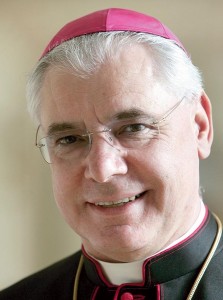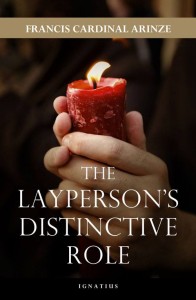The question always surfaces about the fittingness, according to Catholic liturgical theology and supported by Canon Law, for the lay minister of Holy Communion to impart a blessing. The quick answer is that the Church does not offer this as a legitimate possibility for good reasons.
Recently, the priest offering Mass invited all people to the communion line to receive the Eucharist, and if not, to receive a blessing “because we are in communion with the deceased person” –the reason for all of us gathered at the Mass. Father missed the point. While we are in communion with the deceased in some sort of metaphysical level known only to God, the Church teaches what is revealed to us: we are first in communion with God the Holy Trinity, then the sacrament of the Church, and with one another. We have first principles. Coming forward to receive a blessing is a symbolic act reinforcing the painful separation of Christians, and it is clearly a second rate manner of being in communion which says to the person receiving such blessing that they are not good enough to receive the real thing. This priest confuses the faithful and opens the door to even more problems.
The exercise of the priesthood of the faithful is not expressed in giving blessings in the communion line, but it does demonstrate the error of clericalizing the laity. Therefore, let’s say from the outset that a person distributing the Eucharistic species may not bestow a blessing on a person because this is not one of the gifts given by the Church to the priesthood of the faithful. In fact, it is a serious cross-over from the laity to the ordained person.
Parishes rely, with good reason, on the extraordinary minister of Holy Communion because of the sizable the numbers of communicants and the lack of extra ordained ministers: priests and deacons, and the institute acolyte. The lay minister, as well as the clergy, have to respect the dignity of the Eucharist and the administration of the sacrament. But do we tend to see when a person has no intention of receiving the Eucharistic Lord? Typically, we encounter one of three things when the person presents him or herself with arms crossed over the chest:
1. they speak and gesture a sign of the cross over persons;
2. lay hands on such persons’ heads or shoulders while voicing a blessing;
3. waive or place the Holy Eucharist over them while speaking a blessing.
All three actions are liturgical abuses.
Ed Peters, a rather well-regarded canonist, teacher, and author, articulates why these acts are abuses in the sacred Liturgy. Professor Peters states,
Let’s consider them in order of gravity:
1. Blessing the faithful with the Most August Sacrament is expressly reserved to the ordained. Lay persons may not confer any blessings with the Host (Eucharistic worship outside of Mass nn. 91, 97-99, and 1983 CIC 1168). This practice should therefore be immediately halted wherever it has cropped up.
2. Touching many persons’ hair, faces, and/or garments while serving food (albeit divine Food) to the public has to be a violation of some health and safety regulation somewhere, not to mention its being poor manners. If the swine flu makes distribution from a common Cup an issue, surely touching hair and heads while serving others food from a common Plate is a problem. This particular practice should therefore be halted promptly, regardless of what one might think about lay blessings during Mass.
3. Ministers of holy Communion have, I suggest, no authority by their office to confer any sort of blessing on anyone. Neither the General Instruction on the Roman Missal nor the Book of Blessings (which later source makes provisions for laity to administer certain blessings) authorizes ministers of Communion to confer blessings during Mass. Given that lay persons serving as extraordinary ministers of holy Communion have no liturgical duties besides the administration of Communion, the introduction of a mini-blessing rite to be performed by them seems to me a plain violation of Canon 846. This practice should, I think, be halted pending a study of its liceity by qualified persons and, if appropriate, its authorization by the competent authority (1983 CIC 838,1167).
In brief, I suggest that lay ministers of holy Communion have no authority to bless anyone in Communion lines, they should refrain from touching people while distributing holy Communion, and they should immediately cease using the Blessed Sacrament for mini-Benediction rites.
If you are looking for another way of knowing what the Church teaches, Paul Matenaer gives a response in his 2011 article “Can lay ministers give blessings during Communion?” which is worth reading critically as this is no small thing in the Ordinary Form of the Mass. He gives more detail to the answer than Ed Peters did.
Let me conclude: we want to be welcoming to all people, but there are appropriate places, actions and times for one to be hospitable. The communion line is not one of those places.

